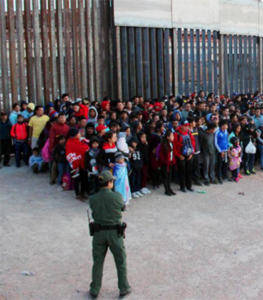Migrants in the US denied COVID-19 protection
Migrants and asylum seekers in the US are among the most vulnerable to the COVID-19 virus because they are the least protected, rights campaigners say.
As the death toll from the pandemic crisis in the US passes 25,000, it has emerged that undocumented migrants in the US will not be included in the $US2 trillion COVID-19 stimulus package signed by President Trump.
 This is despite being more likely to have lost their jobs due to the virus and less likely to be able to afford treatment for it.
This is despite being more likely to have lost their jobs due to the virus and less likely to be able to afford treatment for it.
Not only are asylum seekers left in limbo, but migrants who have already been detained are left at risk, advocates say.
The border closure is said to be meant to prevent the virus from coming into US detention centres, but the virus is already there.
On March 20, President Trump announced the closure of the US-Mexico border to all asylum seekers in the wake of COVID-19, saying the United States will deport anyone caught crossing.
Militarizing the southern border and making immigration more difficult had been on Trump’s agenda since at least his 2016 campaign, but extended legal battles have so far prevented some of his policies from taking effect.
Now, the Trump administration is exploiting the pandemic to invoke the legal authority granted to the Surgeon General and is closing the border under the guise of public health.
Advocates say the border closure violates migrants’ rights as guaranteed by the UN Universal Declaration of Human Rights, and leaves thousands of asylum seekers in an even more perilous position as they become stranded in already overcrowded migrant camps at the border.
The Executive Office for Immigration Review (EOIR), a division of the Justice Department, announced March 23 that some immigration hearings would be postponed.
And on March 27, a federal judge ordered the releases of ten people detained by Immigration and Customs Enforcement (ICE) because of COVID-19 concerns, noting that the jails where they were held have confirmed cases.
Given the lack of testing and the difficulty to social distance in confined spaces, the number of cases is likely significantly higher than reported in these facilities and others.
Health experts advised against the border closure, warning it could be counterproductive.
By immediately turning away asylum seekers, the closure will increase crowding at the already densely packed migrant camps at the border, likely accelerating the spread of the virus.
The Trump administration has also cited concerns for the safety of Customs and Border Protection (CPB) agents to justify the border closure.
A March 20 statement from the White House said the border closure would “protect the health of our country’s dedicated border agents and other law enforcement personnel, who are vital to the security of our Nation”.
But the White House has announced no plans to halt arrests or deportations.
As of March 29, at least four unaccompanied migrant children had tested positive for COVID-19 at a detention facility in New York.
Seven staff members and contractors working in facilities with detained migrant children have also tested positive for COVID-19 in New York and Texas.
The New York Times reported that a federal judge has ruled both ICE and the Office of Refugee Resettlement must “provide an accounting of their efforts to release those children in custody” by April 6.
Amnesty International USA has called for the immediate release of all migrant children. Other organisations are calling for the release of all migrants held in ICE detention.
On March 27, 150 detained migrants launched a hunger strike at the Northwest Detention Center in Washington State.
Other hunger strikes have occurred in Florida, Pennsylvania, Georgia and New Jersey.
Some of the hunger strikers are protesting the lack of protections taken to prevent the spread of the virus in these facilities, while others are calling for their immediate release.












